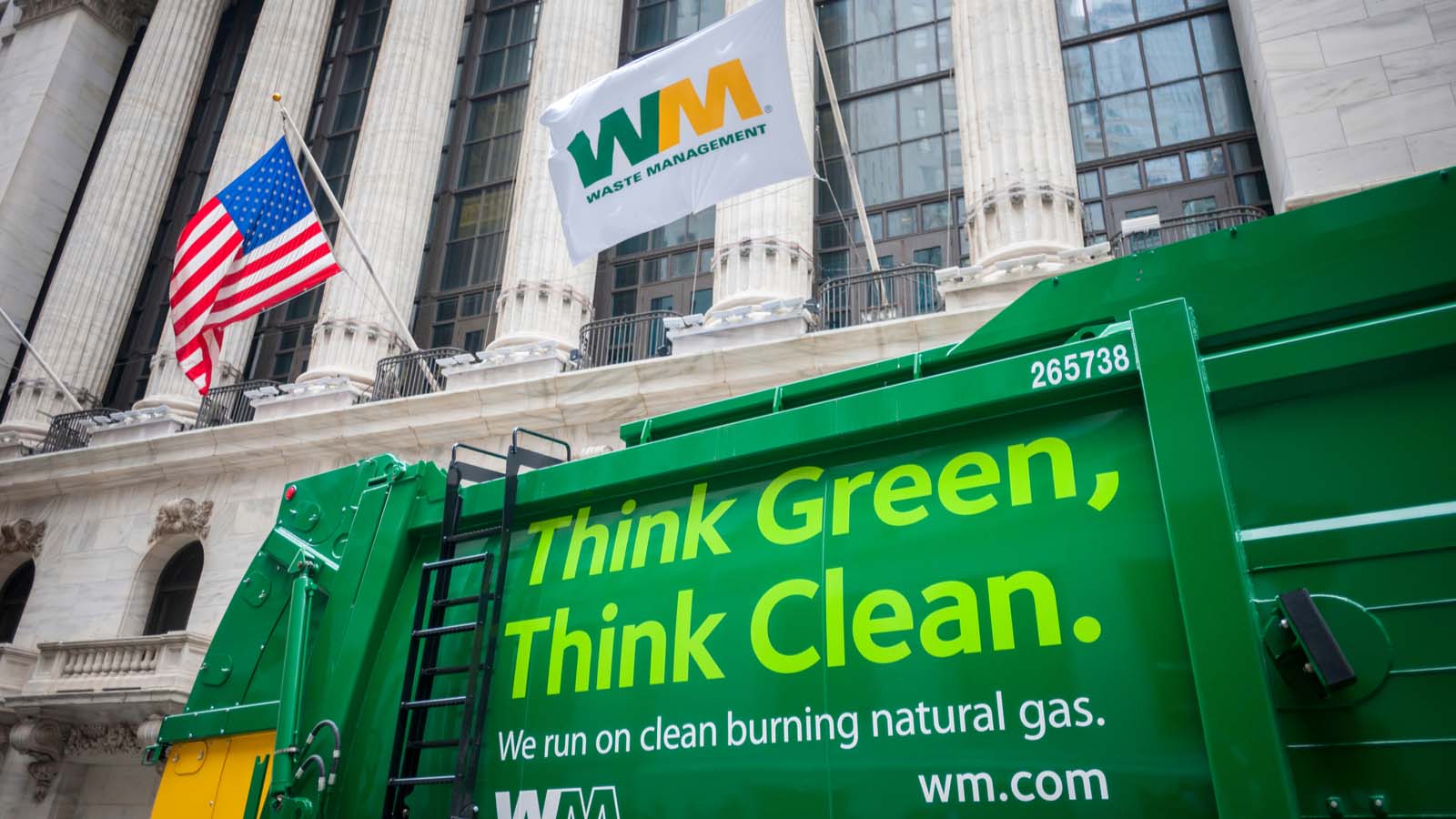Most investors don’t give waste disposal stocks much attention. While it’s not a glamorous sector, it’s produced above-average returns over the decades. In particular, Waste Management (NYSE:WM) stock has been a huge winner.

Over the past 20 years, WM is up more than 500%. Investors would have made nearly 1,000% over the same time span if they reinvested their dividends into more Waste Management shares.
The company’s appeal has grown with the novel coronavirus. Investors are looking for safe haven plays that are largely insulated from economic shocks. And while trash disposal isn’t entirely recession-proof, it holds up pretty well. The company’s stock has bounced back quickly from the March shock as investors realized that the core business remains strong.
As if current events weren’t exciting enough, Waste Management also has a major acquisition in the works. The company is attempting to acquire Advanced Disposal (NYSE:ADSW). Advanced Disposal is a mid-sized operator, as it owns 40 landfill sites currently. Waste Management, by contrast, has nearly 250. Thus, while not a huge deal, it’s enough to add materially to the company.
However, the Department of Justice hasn’t yet given anti-trust approval for the merger either as there’d be a great deal of overlap in markets such as Chicago.
So how does the Waste Management story look at this point with the economic shock and also its planned acquisitions in the works? Let’s take a closer look.
More Than Meets the Eye
At first glance, you might assume Waste Management is a pretty simple business. They send their trucks around periodically to your house, take the trash to the landfill, and that’s that. However, the business is significantly more complex – and profitable – than that.
Waste Management also collects trash from commercial and industrial tenants, who have far higher waste needs than most households. Additionally, Waste Management owns tons of landfills beyond what it needs for its own collection routes. It, in turn, sells this landfill capacity to locally operated third parties that run their own disposal routes.
This makes Waste Management a landlord with scale as it secures landfill sites around the country with cheap capital and then services them out to third parties for a nice margin. There’s also a recycling division.
A Strong Competitive Advantage
Waste Management has earned above-average profits, and thus delivered stellar shareholder returns, because its business is protected from many competitive pressures. For one thing, it’s very difficult to obtain regulatory approval for new landfills in much of the country. Thus, the existing property owners can charge high prices for capacity.
In addition, there are just a few major national companies in the space. Waste Management’s key rivals are Waste Connections (NYSE:WCN) and Republic Services (NYSE:RSG). However, once you go past those, competition tends to be local and not have much scale. This ensures a good deal of pricing power for the large players.
It also creates an ample mergers and acquisitions (M&A) pipeline, as Waste Management can buy out small operations to add additional scale.
Coronavirus Impact
The virus has had a mixed impact on the company’s overall business. Volumes in some areas, such as residential, are robust as people spend more time there thanks to quarantine. On the other hand, industrial demand is down, and in some areas, commercial demand in particular is off sharply.
This looks to cause a mid-single digits overall decline in Waste Management’s business for the year. The recycling business also faces pressure. A weak overall economy causes demand for recycled materials to fall, hurting the company’s margins there.
However, recycling had been sluggish since 2017 thanks to issues with demand out of China, so the drop here may be less than you’d normally expect as prices were already low prior to the virus.
WM Stock Verdict
Waste Management’s huge and highly integrated business offers some perks but also a few drawbacks. Investors have focused on the negatives thanks to the virus. Yes, demand will be down from commercial disposal and also as recycling prices stay depressed.
It’s not clear that the virus will have any negative long-term impact on Waste Management, though. While a shift in restaurants from on-location eating to delivery may kill a mall or shopping center owner, it doesn’t matter to a trash company: all those pizza boxes still have to be taken care of one way or another.
That is to say that landfills are a flexible and adaptive asset. The economy is experiencing rapid transformation right now, but there’s little sign it will change humans’ basic desire to consume vast quantities of goods and services.
On a valuation basis, Waste Management isn’t particularly cheap, as it sells with a price-earnings ratio of around 26. On a normalized basis, using 2017 and 2018 earnings as the benchmark, the ratio is closer to 23. Assuming the economy recovers reasonably quickly, earnings should return to at least those levels. Earnings could go higher once the Advanced Disposal acquisition takes place, assuming the government gives regulatory approval.
With those factors in mind, Waste Management should get to an EPS of $5 within the next couple of years. That would result in a reasonable earnings multiple of 21. It’s hard to argue that WM stock is especially cheap, but it’s a fine pick as a defensive play with a decent growth profile.
Ian Bezek has written more than 1,000 articles for InvestorPlace.com and Seeking Alpha. He also worked as a Junior Analyst for Kerrisdale Capital, a $300 million New York City-based hedge fund. You can reach him on Twitter at @irbezek. At the time of this writing, he held no positions in any of the aforementioned securities.
